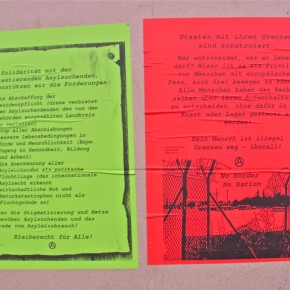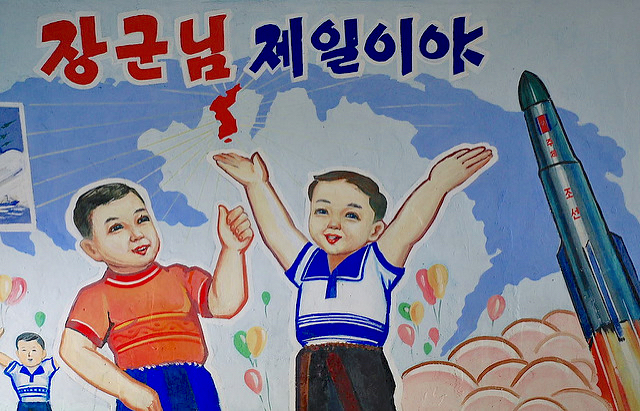While I was in Lahore, I met a relative for the first time. Noting my academic interest in Islamic militarism, he asked to hear my views. Eventually, this led to a blunt question: “So what do you think about the way the Jews control everything and ruin everything for people?”
I was not particularly surprised by this question. My memory is fresh with casual anti-Semitism. I recall a road trip when a relative told me a conspiracy theory about how Jews left the Twin Towers the morning of September 11th. Multiple people have told me that the real reason for the beheading of American journalist Daniel Pearl was his Jewish ancestry. There is a very real strain of anti-Semitism in Pakistani society that it is irresponsible to deny. The questions they raise are important.
Although pundits may portray such statements as simply a continuation of past prejudices against Jews, their contemporary force is a reaction to two ongoing crises: Israel’s conflict with the Palestinians, and capitalist globalization.
Serious analyses of anti-Semitism in Muslim countries such as Pakistan have to accept an uncomfortable reality. The brutal excesses of Israel’s policies towards the Palestinians, especially as it is identified with religious fervor, are intensely felt in southern Asia. Especially since the Second Intifada, the collective humiliation felt by Muslims around the world have inspired a sense of rage and injustice, creating a much larger antagonism towards Israel than had previously existed. Pakistan is part of this world. In the absence of efforts to channel this anger into effective diplomatic pressure, blanket statements against Jews hold great appeal. Anti-Semitism becomes a vehicle for attacking Israeli policy.
Seldom forgotten is how this is reinforced by political developments in Israel itself. Although initially secular and grounded in socialist traditions, Israeli society has become increasingly religious. Much of this is a result of the settlements, which are frequently legitimized by fundamentalist rhetoric, and much of this is a consequence of Israel’s transition over the last two decades to a fully market economy.
It would follow that a political leadership that insists on pressing for an identity as a Jewish state would begin to be seen as a representative of Judaism more broadly than Israel, by itself. It would further follow that images of violence against Palestinians perpetrated by this Jewish state would be viewed as an expression of Judaism itself, rather than of Israeli policy. Racism and colonialism are consequently regarded as being linked with the Jewish religion.

Such equations are a reflection of a Pakistani inability to reconciles themselves to the negative consequences of capitalist globalization. Here we see a parallel, with the gradual revival of anti-Semitism in 19th century Europe: rather than comprehend capitalism as an abstract social force, the Jew becomes a convenient scapegoat for its destructiveness. Thus, Jews are attacked for qualities that capitalism encourages and popularizes: greed, selfishness, and moral depravity to name a few. More broadly speaking, they are, the agents of social ills, instead of the market.
This era of globalization has brought about new conflicts. Within Pakistan, a decade of terrorism and American drone strikes have left Pakistanis prone to indulging conspiracy theories. The idea of unexposed class struggle, and senseless violence being the result of a world that is rudderless, is simply too difficult to bear. This is especially true for a population that is still working through the powerlessness of colonialism, as anti-Semitism also offers an opportunity for bigoted superiority. [Nevermind the fact that Israel is itself, like Pakistan, a post-colonial construct of the late British Empire.] It is exactly this psychology that leads to Pakistanis subscribing to anti-Semitism when it is circulated, whether by existing rumor or cynical power plays by the country’s military-civilian elite.
Are such events as a reprinting of The Protocols of the Elders of Zion in Pakistan therefore a cause for alarm? Perhaps. It is certainly true that liberal democracy, historically the best antidote to European anti-Semitism, is not as healthy as it once seemed. However, concerns regarding regional anti-Semitism betray ignorance about both Pakistani politics, not to mention the history of anti-Semitism itself. Why would Pakistan share Western prohibitions against the prejudice? Where is the Jewish population that such legislation is expected to protect?
In Europe, the likelihood of the Holocaust ever happening again has been reduced significantly by the fact that the Holocaust happened. The defeat of fascism in the Second World War induced a global respect for republicanism and democracy, which was once again renewed following the collapse of the Soviet Union. As a result, anti-Semitism has lost its appeal. This doesn’t mean that western extremists don’t subscribe to it, in developing democracies, such as Hungary. What it does mean is that it is unlikely to ever influence state policies again. That’s an important distinction to remember.
In returning to the Pakistani context, I fear we often forget the specificity of its example, in favor of our taking for granted the fact that Pakistan does not share in the West’s experience of fascism. Subsequently, though anti-Semitism exists, genocide is not being carried out against Jews. Other minorities are being violently persecuted instead, such as the Sh’ia Hazara, along with various tribal groups. Perhaps Jews would be targets, if there was a local community. However, that would make it difficult for them to serve as useful abstractions, to whom Pakistanis project their powerlessness on to. It’s useful, in some respects, there are no Jews here.
When I, as a Pakistani-American, hear my Jewish friends profess their anxieties about Pakistani anti-Semitism, I always want to explain its context to them this way. Prejudice against Jews is most certainly real, and is a consequence of a number of discernible factors. But its victims are about as far from Jews as one can get. Who are they? In classic anti-Semitic fashion, Pakistanis are its victims. Will this ever change? I’m not so sure. In the absence of a viable left, I sincerely doubt it. If only the Israelis and the Americans understood their impact here, and were the least bit inspired to help rectify it. At the very least, it’d be one less obstacle for Pakistan to contend with.
Photograph courtesy of Michael Foley and mekong69. Published under a Creative Commons license.






Bilal writes — “In Europe, the likelihood of the Holocaust ever happening again has been reduced significantly by the fact that the Holocaust happened. The defeat of fascism in the Second World War induced a global respect for republicanism and democracy, which was once again renewed following the collapse of the Soviet Union. As a result, anti-Semitism has lost its appeal.” Europe’s modern history has been characterized by repetition as much as by industrial and post-industrial development. For example, a common belief following The Great War was that such a war, having happened, could never happen again. Liberal democracy offers minorities limited protections that can be appreciated despite their insufficiency, but not against historical repetition. Minorities in Europe live with a consciousness of that liberal societies may cease being liberal, and that all European societies are heavily veined with racism that can and does emerge regularly. The European left views racism as a feature of right-wing politics without recognizing that racism, like sexism, exists on a continuum. One does not need to look at Pakistan to recognize the anti-semitism involved in associating Jews and Israel as a whole with colonialism and imperialism. It happens daily in Euro-left discourse, which makes political association difficult for Jewish leftists with either deep attachment to Israel — including myself — or a semblance of ethnic self-respect. Anti-semitism in Europe has reformulated itself on the left while remaining the same old on the right. For one, I do not share my friend Joel’s fascination with Europe and prefer to look towards Asia and its continued emergence. In this sense of re-direction, your thoughts are helpful, as are Leshu Torchin’s qualifying comments above.
Thank you for your feedback, Joe! I agree that modern European history has been characterized by repetition, but it would be careless to overlook how that intersects with liberal democracy itself. Unfortunately, this piece could not discuss this history with much depth, but the “repetition” you discuss arise as a result of new factors and often require the disassembly of liberal democratic institutions themselves in favor of a restorationist or nihilistic revolutionary ideal. Simply charging it as “repetition” ignores the rich developments at play. Nothing ever happens in the same way and things always occur as a result of something else– for instance, the Holocaust would have probably never happened were it not for trench warfare, the fall of four major continental empires dating back nearly 1000 years (and a need to rationalize that), and the economic disintegration which John Maynard Keynes discusses in his book “The Economic Consequences of the Peace.”
The opinion that anti-semitism has restated itself in Euro-left discourse doesn’t strike me as analytically sound. One need only listen to Silvio Burlesconi downplaying Italian Fascism’s associations with the Holocaust for that to be made clear. Perhaps most importantly though, if we’re discussing “repetition,” Aushwitz occurred in a Continental Europe where liberal democratic institutions were overthrown by international fascism. Antisemitism could not lead to action in settings where the liberal state had taken root. It is exactly this state that has historically offered the best protection against mobilized anti-semitism which is attacked, pushed against, and held in deep contempt by those who back austerity in the European Union.
Textual evidence or social science data go much further towards establishing analytic soundness than mere opinion, especially when that opinion is expressed in a format such as talk-backs. The EU’s Fundamental Rights Agency, perhaps as good a paradigm of a liberal state institution as exists in Europe today, has gone and continues to go to much effort and expense to document contemporary anti-semitism in EU countries. FRA reports have documented repeatedly the extent and varieties of anti-semitism across Europe, as well as the even more profound spread of anti-Islamism. Yet the national reports on which FRA bases much of its reporting often focus on right-wing manifestations since these tend to express core values of far-right nationalist expression.
Left-wing manifestations typically reject racism even while framing rationales for anti-semitism. This leads to ‘anti-semitism without anti-semites.’ Left anti-Zionism becomes a means of circumventing social taboos against anti-semitism. One excellent example of this Euro-left style would be autonomist theorist Franco Berardi’s self-proclamation as a Jew, but as a paradigm of stateless and anti-national existence. This enables him to condemn anti-semitism while calling for the liquidation of Israel as a nationalist project, irrespective of the cultural and physical liquidation of Jews that such advocacy would entail if realized. Berardi does not seem to realize that he repeats in secular terms a much older religious rhetoric of idealization followed by damnation, as when Martin Luther praised Jews for resisting conversion by the Catholic Church only to condemn them with fulminating bitterness once he realized they were not going to become Protestants either. Euro-left texts similar to Berardi are easily available should one care to read beyond their surface claims.
If one reads ethnicity in conjunction with class, the deficiencies of liberal democratic states are far clearer. One of the leading characteristics of liberal states has been the affirmation of civic equality in principle even while denying in practice equality claims by economic, racial/ethnic, and gender classes. Placing excessive faith in the protections afforded by liberalism and neo-liberalism seems unwarranted given that the harms of racism and sexism continue to proliferate. Such false faith can direct our eyes away from the daily victims of liberal states.